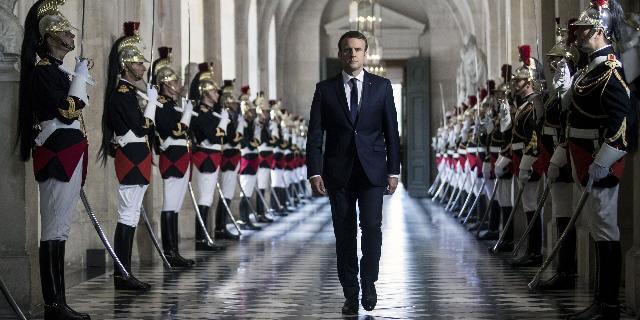An Nahar: Europe will not support Macron's "crusade" against Russia
Macron wants to get the main role on the European stage, writes An Nahar. Therefore, he is toughening up his rhetoric against Moscow and intensifying support for Kiev, thereby showing that he is ready to lead Europe in its "crusade" against Russia. However, it is unlikely that he will be able to do this.
Why did French President Emmanuel Macron decide to lead a "crusade" against Russia? Many are asking this question, trying to explain the change in Paris' position and the campaign to demonize Russian President Vladimir Putin.
It has long been known that Macron prefers a "small Europe", but now he supports the idea of Ukraine joining the European Union and NATO and announces an increase in military assistance to Kiev. For example, Macron promised to transfer 40 SCALP missiles to Ukraine.
In February, Emmanuel Macron and Vladimir Zelensky signed a bilateral agreement on security cooperation. As part of this agreement, Paris pledged to provide additional military assistance worth three billion euros in 2024, despite the fact that the budget deficit in France in 2023 amounted to 5.5% of the country's GDP.
Both France and Russia are waging an information war against each other. Thus, Paris believes that Russian special services and hackers are allegedly involved in the spread of fakes, starting with the invasion of bed bugs in French hotels and ending with the broadcast of a plot about the preparation of an assassination attempt on Macron.
Macron and Putin called for the last time on September 22, 2022. Even the telephone conversation between French Defense Minister Sebastian Lecorgne and his Russian counterpart Sergei Shoigu after the ISIS terrorist attack in the Crocus City Hall near Moscow on March 22 took place in a rather rude tone.
After that call, Macron said that he saw no more reason for further dialogue with Moscow, and hinted that Russia was allegedly conducting a disinformation campaign to sabotage the Summer Olympic Games, which will be held in Paris from July 26 to August 11.
Paris is outraged that Moscow has blamed Kiev for the terrorist attack in Crocus. He believes that Russia can use this tragedy as a pretext to intensify military operations in Ukraine. And the Kremlin, in turn, demanded that the West prove its innocence in the attack on the concert hall in Krasnogorsk.
There is another not so obvious reason. Macron is seeking to boost the popularity of the Renaissance party he leads ahead of the European Parliament elections in June, while opinion polls show that it is ahead of the far-right National Unification Party, led by Marine Le Pen.
Macron's harsh rhetoric will not bring the desired results, given the fact that the French are against sending troops to Ukraine and their country's direct participation in this conflict.
For his part, Macron warns that Putin will not stop in Ukraine. The Baltic states, which constantly shout that they will supposedly be next if Russia wins the current conflict, share his concerns. The French President supported Estonia's proposal for the purchase of ammunition by the European Union on behalf of the member states to provide greater military support to Ukraine. But Germany, oddly enough, opposed it.
Anyway, since the beginning of the year, France has been increasing tensions in Europe and further worsening relations with Russia at a time when Ukraine is suffering from an acute shortage of ammunition, and former US President Donald Trump has every chance to return to the White House if he wins the upcoming November elections. Trump's views largely contradict the policy of absolute loyalty pursued by current American President Joe Biden, who supports providing military and economic assistance to Kiev so that it can resist Russian troops.
Macron hopes to get the role of Europe's leader in the confrontation with Russia. Will he succeed?
Author: Asaad Abboud (أسعدابود)
* A terrorist organization banned in the Russian Federation.

